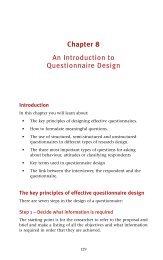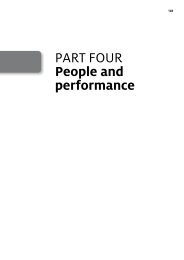The growing business handbook : inspiration and advice ... - Sparkler
The growing business handbook : inspiration and advice ... - Sparkler
The growing business handbook : inspiration and advice ... - Sparkler
Create successful ePaper yourself
Turn your PDF publications into a flip-book with our unique Google optimized e-Paper software.
Acquisitions that work<br />
231<br />
Issue 4<br />
<strong>The</strong> money!<br />
<strong>The</strong>re are always far more deals that could get done than do get done. <strong>The</strong> human<br />
factor is always important (see below), but I think it is fair to say that money is the<br />
single quickest way to bring out that factor.<br />
Research in late 2006 showed private equity winning 74 per cent of bids in<br />
competitive situations against trade buyers. Not only did this reflect a willingness to<br />
pay around 10 per cent more, but also derived from the fact that the PE firm had<br />
typically raised its fund, while the trade buyer so often expected to borrow on the<br />
target <strong>and</strong> couldn’t get everything done in time. <strong>The</strong> issue is even clearer when we<br />
look at MBOs <strong>and</strong> MBIs. <strong>The</strong>se are normally teams of individuals who are putting<br />
themselves on the line – resulting in deals that tend to transact at about 10 per cent<br />
lower prices than trade sales.<br />
I find it fascinating that those who were unlikely to gain from amalgamating<br />
functions <strong>and</strong> other related savings were prepared to pay more. This is because they<br />
think entirely strategically. It is potential they are seeking to unlock, as a route to<br />
value. <strong>The</strong> trade buyer, who has most to gain immediately, is usually slow to make<br />
decisions <strong>and</strong> poor on the money management side. <strong>The</strong> MBO/MBIs are treated by<br />
sellers as poor relations.<br />
<strong>The</strong> recession knocked these verities about a bit, but things are now not far off the<br />
previous status quo – just with fewer outfits buying!<br />
Solution 4<br />
Always secure your line of finance before making a firm offer. It’s fine to make an<br />
indicative offer prior to funds being secured, but there is still the risk of your offer<br />
being accepted! <strong>The</strong>re is nothing more detrimental to your credibility than not being<br />
able to progress a deal because funds are held up.<br />
Most trade buyers want to borrow on the target. Most lenders want to lend on the<br />
buyer! If your bank will not consider lending to you on your own assets, cash flow or<br />
profit, I would argue that you are in too marginal a situation to afford the right buy.<br />
Of course, there is always an exception to the rule. Why are you it?<br />
If you are a MBI team, build credibility. Lenders lend on the proposal, the people<br />
<strong>and</strong> the purchase. Are all three equally credible, or does one let you down? <strong>The</strong> same<br />
principles apply for any form of leveraged deal.<br />
Issue 5<br />
<strong>The</strong> people!<br />
I am afraid that we are now on ground where no statistic helps <strong>and</strong> no pattern can<br />
be relied upon. What can be said, is that if yours is a people <strong>business</strong>, there is no more<br />
risk in buying a people <strong>business</strong> than using normal recruitment practices. In fact,<br />
observationally, there is often less risk since you are buying a proven functioning








